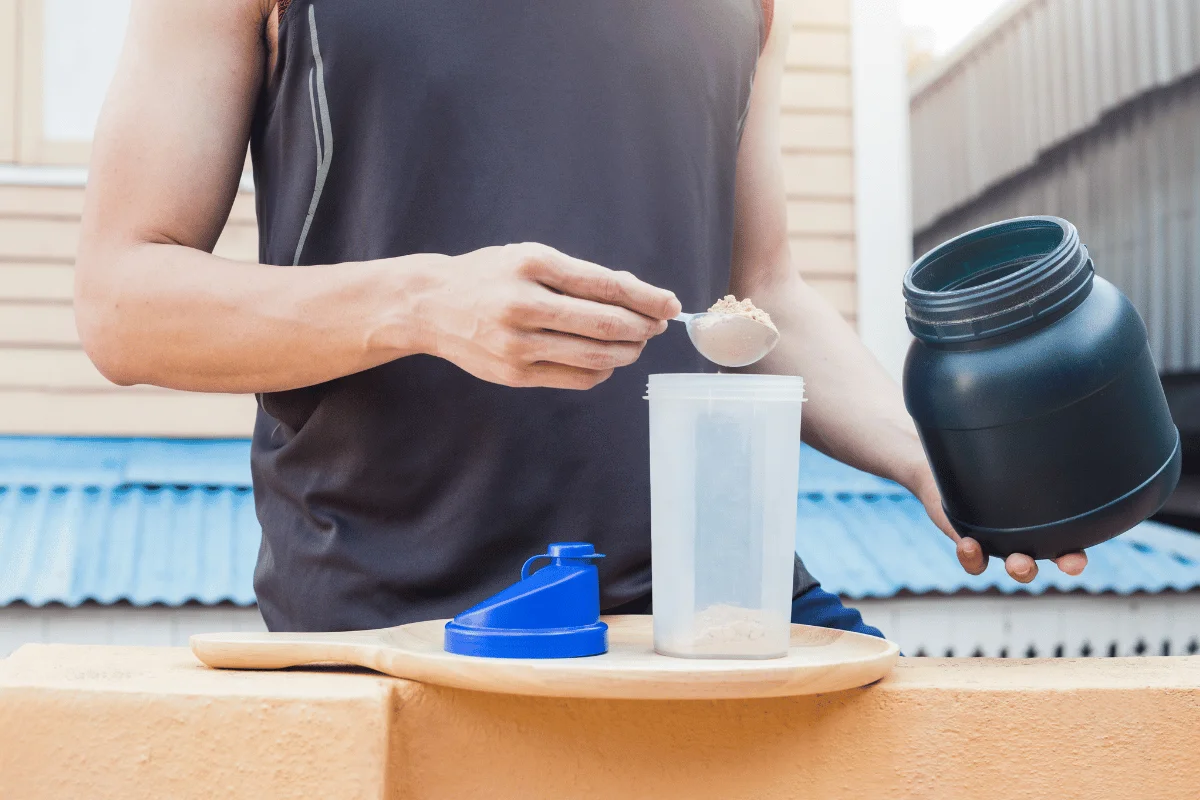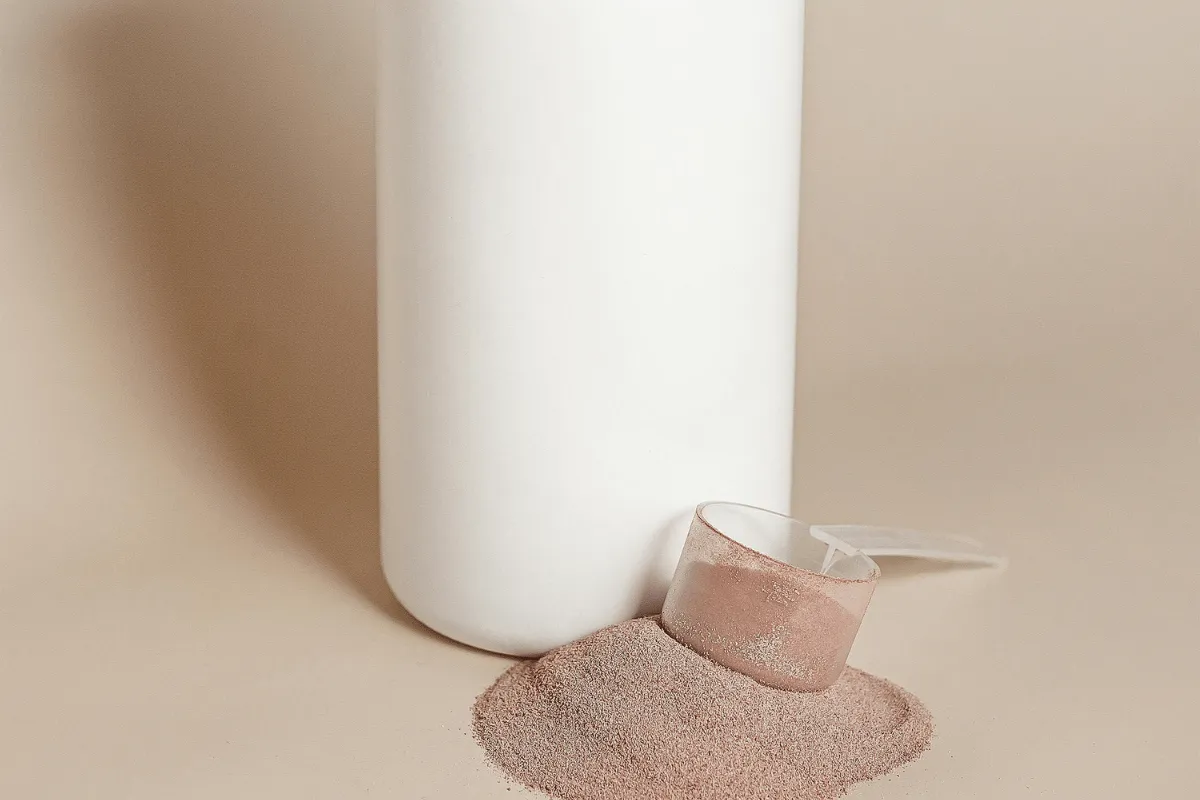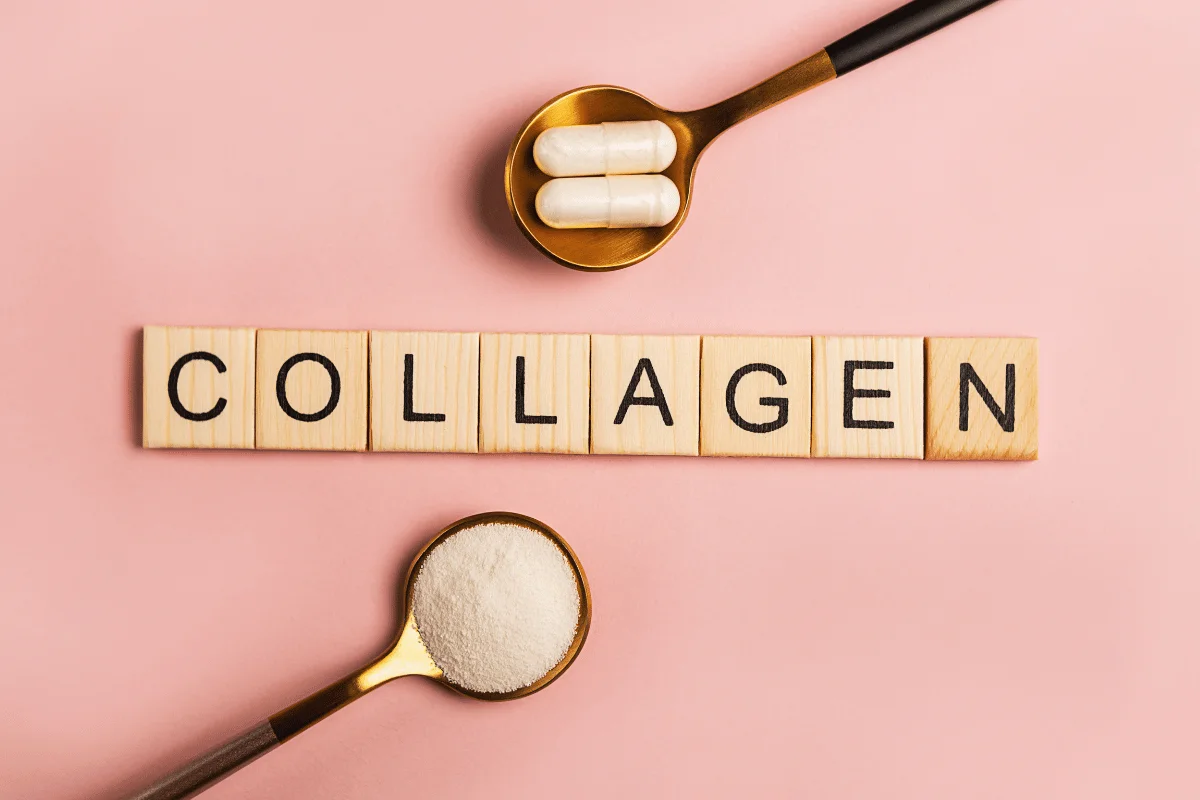[Disclaimer: The information in this article is intended for general informational and educational purposes only. It should not be used as a substitute for professional medical advice, diagnosis, or treatment.]
You probably have collagen working hard in your body right now – it’s the protein that keeps your skin plump, joints flexible, and bones strong.
As you reach your mid-20s, your natural collagen production slows down. This is when you might notice your skin losing that youthful bounce or your joints feeling a bit less springy.
The beauty industry has stepped up with a solution: collagen supplements!
You’ll often spot two main players on the shelves – marine collagen and collagen peptides. So, what’s the difference, and is one better than the other?
Keep reading as we explain it all.
TL;DR – Marine Collagen vs. Collagen Peptides
Here’s a quick comparison to help you understand the key differences:
| Marine Collagen | Collagen Peptides |
| A protein extracted from fish parts like scales and skin. | Small protein chains – derived from land animals like cows and pigs. |
| Pros | Pros |
|
|
| Cons | Cons |
|
|
| Best For | Best For |
| Improving skin hydration, elasticity, and fine lines | Overall connective tissue and joint health |
Marine collagen shines for skin anti-aging benefits, while collagen peptides can better support whole-body wellness.
What is a Marine Collagen?
Marine collagen comes from fish skin, scales, and bones – parts that are usually discarded during fish processing.
But don’t let that put you off.
These “waste” materials are rich in a special type of protein that’s remarkably similar to your body’s collagen.
Unlike collagen from cows or pigs, marine collagen has some unique advantages.
Because of its simpler molecular structure, the body can absorb the fish more easily absorbed. They are also safer because they don’t carry diseases that can affect humans.
Here’s what makes it particularly special: Marine collagen is especially rich in Type I collagen, which makes up 80% of your skin’s structure.
When researchers studied marine collagen under microscopes, they found it contains specific amino acids like glycine, proline, and hydroxyproline, which help keep skin firm and elastic.
What is Hydrolyzed Marine Collagen?
Hydrolysis is a process that breaks down large collagen molecules into smaller, more usable pieces.
Scientists hydrolyze marine collagen using special enzymes that create tiny protein fragments called peptides. These peptides are small enough to actually get absorbed into your bloodstream.
The process involves several steps:
- Breaking down fish collagen using proteolytic enzymes like alcalase or papain
- Creating peptides with a molecular weight of 3-6 kDa
- Purifying these peptides to remove any unwanted compounds
Hydrolyzed peptides can reach deep skin layers and even your joint tissues, something regular collagen molecules are too big to do.
In fact, studies found that these bioavailable collagen peptides were absorbed up to 1.5 times more efficiently than other forms of collagen.
According to the research by Zhang Hu & team, hydrolyzed marine collagen peptides show impressive results even at concentrations as low as 50 μg/mL!
An Interesting Fact: Marine collagens are easier to hydrolyze than mammalian ones, making them perfect for creating these specialized peptides.
This means:
- Less processing required
- More natural end product
- Better bioavailability
- More cost-effective production

What is Marine Collagen Good For?
Here are the main areas where marine collagen shines:
1. Wound Healing
Marine collagen can:
- Speed up wound closure
- Promote skin cell migration
- Increase blood vessel formation
- Enhance tissue repair
Studies by Yang et al. found that wounds treated with marine collagen showed:
- Complete re-epithelialization (healing of the skin’s protective outer layer) by day 12
- Presence of new hair follicles
- Better keratinocyte migration (meaning your skin cells move and multiply more effectively to heal wounds)
2. Anti-Aging Benefits
A 2021 randomized, triple-blind study found that participants taking marine collagen showed a significant 35% reduction in wrinkles after 12 weeks.
They also found:
- 14% improvement in hydration
- 22% improvement in radiance
- 25% improvement in skin firmness
3. Bone Health
Marine collagen supports several aspects of bone health:
- Increased Bone Mineral Density: In one study, postmenopausal women taking 5g/day of marine collagen peptides for 12 months saw a 3% increase in spinal bone mineral density and a 6.7% increase in femoral neck density compared to placebo.
- Improved Bone Strength: Marine collagen supplementation for 3 months in ovariectomized rats inhibited the loss of biomechanical strength in vertebrae by 5-15%, compared to the control.
4. Joint Health
Marine collagen hydrolysates, specifically Promerim® variants, show significant benefits for joint health:
- Reducing Joint Pain and Cartilage Regeneration: It boosts chondrocyte activity, the cells that maintain the cartilage. These collagens reduce the production of certain enzymes that break down cartilage. These enzymes are the “bad guys” in joint health.
- Stopping Osteoarthritis Progression: Osteoarthritis (OA) is often caused by inflammation that wears down cartilage. Promerim®30, a type of marine collagen, slowed down cell aging (senescence) and increased type II collagen production, essential for strong cartilage. It also reduced Cox2 inflammatory markers—the “triggers” that worsen joint problems.

What is the Best Marine Collagen?
The quality of marine collagen depends heavily on its source and processing methods. Your best bet is collagen derived from cold-water fish like cod or salmon, which tends to be more stable and bioactive.
Some top options:
- Fish Collagen:
- Especially from fish skin
- High in Type I collagen
- Excellent bioavailability
- Sustainable source
- Marine Sponge Collagen:
- Natural scaffold-like structure
- Great for bone tissue engineering
- Highly biocompatible
- Supports cell growth
- Jellyfish Collagen:
- Excellent for wound healing
- Good for bone regeneration
- Naturally structured
- High water content
Recent research in the South African Journal of Chemical Engineering highlighted that the extraction method matters tremendously.
Scientists found that enzymatic hydrolysis produces the most bioavailable form of collagen, while chemical processing can damage important amino acid structures.
When choosing a marine collagen supplement, look for:
- Products sourced from wild-caught fish rather than farmed varieties
- Third-party testing certificates that verify purity
- A complete amino acid profile listed on the label
- Transparent information about the extraction method used
How Much Marine Collagen Per Day is Suggested?
Based on a review article published by Marine Drugs Journal, here are some evidence-based dosage guidelines:
For Skin Benefits:
- 570mg daily
- Results seen within 6-12 weeks
For Joint Health:
- 10g daily
- Best taken consistently
For Wound Healing:
- 50 μg/mL concentration (topical application)
- Oral doses vary by product
Remember:
- Start with a lower dose and increase gradually
- Consistency is key to the best results
- Morning consumption on an empty stomach may improve absorption
- Always consult healthcare providers before starting any supplement
Marine collagen also has an excellent safety profile, with very few reported side effects at recommended doses.
It’s generally well-tolerated by most people, making it a safe choice for long-term use.

What is a Collagen Peptide?
Collagen peptides are shorter chains of amino acids created from breaking down full-length collagen proteins.
These peptides are typically sourced from cattle (bovine), pigs (porcine), or chickens.
What makes them special is how they’re processed – through a method called enzymatic hydrolysis, which breaks down collagen into pieces your body can use.
This is why you’ll sometimes hear them called “hydrolyzed collagen” or “collagen hydrolysate.”
The science behind peptides is fascinating.
They contain 19 different amino acids, with three key players making up about 57% of the mix:
- Glycine – helps your body produce its own collagen
- Proline – supports joint health and muscle recovery
- Hydroxyproline – gives collagen its unique stability

What is Collagen Peptide Good For?
Your body can use collagen peptides in several amazing ways:
1. Joint and Bone Support
If you’re dealing with joint discomfort, collagen peptides might help. They work by stimulating your body to produce more cartilage tissue.
Doses of 5-15g per day have been shown to improve joint function and reduce pain, with benefits typically appearing after 3 months of consistent use.
Findings from clinical trials include:
- Recreational athletes taking 10g daily for 24 weeks reported reduced joint pain during walking, standing, and carrying objects
- A 12-week study on elderly participants (average age 72 ± 5 years) with early signs of sarcopenia found that taking 5g of collagen daily reduced knee pain by 38.4%, compared to 27.9% in the placebo group taking a non-collagen or neutral supplement.
- Athletes needed fewer alternative therapies for joint pain when taking collagen (12 vs 39 times from baseline in one study)
Take collagen supplements for at least 3 months for optimal results, as significant improvements weren’t typically seen before this time.
2. Skin Health and Anti-Aging
Recent studies show that regular collagen peptides can improve skin elasticity and hydration. You might notice fewer wrinkles, too.
A 2024 Dermatology Research and Practice study found that daily collagen supplementation improved skin elasticity by 22.7%, increased hydration by 13.8%, and reduced wrinkle measurements by 19.6% compared to placebo after 12 weeks.
3. Muscle Recovery
For anyone who exercises regularly, collagen peptides contain specific amino acids that help repair and build muscle tissue.
Combined with resistance training, they improve muscle mass and strength more effectively than training alone.
A 12-week study found that participants taking 15g of collagen peptides daily while doing resistance training showed:
- A significantly higher increase in fat-free mass (+4.2 kg) compared to placebo group (+2.9 kg)
- Greater improvement in muscle strength (measured as quadriceps strength during controlled movement)
4. Gut Health Benefits
Your digestive system benefits from collagen supplements, too.
The amino acids in collagen peptides, especially glycine and glutamine, help maintain and repair your intestinal lining.
This could help if you’re dealing with digestive issues or trying to improve your overall gut health.

What Does Collagen Peptide Do?
Collagen peptides provide concentrated amino acids to stimulate your body’s own collagen production.
The effects include:
- Strengthening connective tissues like skin, cartilage, and tendons
- Supporting moisture, elasticity, and wrinkle reduction
- Boosting muscle repair and joint shock absorption
- Bolstering the protective gut lining
Rather than directly building tissues like native collagen, peptides act as messengers to remind your cells to crank up collagen synthesis.
What is the Best Collagen Peptide?
The best collagen peptides are enzymatically hydrolyzed at controlled temperatures.
This preserves their bioactive properties and ensures better absorption. Look for products that clearly state their hydrolysis method.
Opt for collagen from grass-fed, pasture-raised animals.
These sources typically have better amino acid profiles and fewer contaminants. Avoid products that don’t specify their collagen source.
Gastroenterology Research shows peptides with a molecular weight between 2-5 kDa are optimal for absorption.
The best products will specify their peptide size range, showing they’re serious about quality and effectiveness.
How Much Collagen Peptide Powder Per Day is Suggested?
The right dosage depends on your goals, but here are some clear guidelines:
- General Wellness: 10-15 grams daily
- Joint Support: 15-20 grams daily
- Sports Recovery: 15-25 grams daily
- Skin Health: 10 grams daily
Timing matters, too. For optimal absorption:
- Take your collagen on an empty stomach or 20 minutes before meals
- Split larger doses throughout the day
- Consider taking it with vitamin C to enhance absorption
- Stay consistent – daily intake is more important than timing
It’s normally safe to take collagen peptides long-term, with studies showing no adverse effects from daily use for 6 months or longer.

Relevant Characteristics Between Marine Collagen and Collagen Peptides
Let’s compare these two popular collagen supplements side by side to understand how they differ in key aspects:
| Marine Collagen | Collagen Peptides | |
| Source | Fish skin, scales, bones | Bovine, porcine, marine, egg membrane |
| Amino Acid Profile | Abundant in glycine | Contains a mix of amino acids, including glycine, proline |
| Absorption Rate | Fast absorption into the bloodstream | Varies depending on processing; hydrolyzed has better absorption |
| Sustainability | Converts fish byproducts into a supplement | Depends on animal farming practices |
| Taste | Virtually no taste or smell | Typically, there is no taste unless it is flavored |
| Targeted Benefits | Mainly skin health and beauty | Broad connective tissue support |
| Allergen Risk | Fish/shellfish allergy risk | Generally low |
| Price | Higher | Lower |
| Bioavailability | Highly bioavailable | Varies |
| Digestibility | Well-tolerated | Typically easily digested |
| Smell | No discernible odor | No odor |
Similarities and Differences
Marine collagen and collagen peptides share some common characteristics but also have key differences worth highlighting.
Marine Collagen and Collagen Peptides Differences
Despite having “collagen” in common, marine collagen and collagen peptides have some key differences:
- Source Material
- Marine collagen: Exclusively from fish
- Collagen peptides: Multiple animal sources
- Collagen Types
- Marine collagen: Predominantly Type I
- Collagen peptides: Types I and III
- Cost and Availability
- Marine collagen tends to be more expensive
- Collagen peptides are widely available and more affordable
So, if you avoid all meat or want purity from one seafood source, marine collagen has appeal. However, collagen peptides offer more joint benefits and can come from various sources.
Marine Collagen and Collagen Peptides Similarities
Both forms:
- Need to undergo hydrolysis for better absorption
- Provide essential amino acids
- Support skin and joint health
- Are generally well-tolerated
- Can be easily mixed into beverages
Both provide proven collagen-boosting peptides that your body readily absorbs and uses where they’re needed most.

What About Bovine Collagen Peptides?
Bovine collagen peptides deserve special mention as they’re the industry’s most studied and widely used form of collagen peptides.
These peptides are primarily extracted from cow hides, bones, and connective tissues, but they have some interesting considerations.
Here’s what makes bovine collagen peptides unique:
Composition and Structure:
- Contains both Type I (found in skin and bones) and Type III collagen (found in blood vessels and organs)
- Shows high similarity to human collagen structure
- Has higher thermal stability compared to marine sources due to higher imino acid content
Key Benefits:
- Joint and Cartilage Support: They’re particularly effective at promoting cartilage regeneration through increased collagen synthesis.
- Gut Health: The high glycine and glutamine content helps strengthen intestinal barriers.
- Bone Strength: Helps increase bone mineral density and supports calcium absorption.
- Immune Function: This may help regulate inflammation and immune responses.
For best results, take 10-15 grams daily; you can even take higher amounts (15-20g, if tolerated well), potentially beneficial for specific goals like joint support or muscle recovery.

Bottom Line
Marine collagen vs collagen peptides – both have science supporting their safety and efficacy for similar benefits.
Choosing the best collagen supplement depends largely on individual factors:
Pick marine collagen if you avoid meat, want purity from one seafood source, and are most focused on skin anti-aging effects.
Choose collagen peptides for flexibility in sourcing that appeals to more diets, with evidence for broad connective tissue repair beyond just skin.
Take both together to maximize your Types I and III collagen intake for full support. They perfectly complement each other!
Ensure any collagen supplement undergoes third-party purity testing and provides 10+ grams of peptides per serving.
Frequently Asked Questions (FAQs)
Here are the answers to some common questions about marine collagen and collagen peptides:
Are Marine Collagen and Collagen Peptides Processed Differently?
No, both usually undergo enzymatic hydrolysis to break the long collagen protein chains into small peptides for better absorption.
However, different enzymes or methods could impact peptide sizes.
Is Marine Collagen More Sustainable than Other Collagen Peptides?
Yes, marine collagen is generally regarded as more environmentally friendly since it repurposes fish byproducts instead of farmed animals, especially with brands ensuring responsible fishing practices.
Studies indicate up to 75% of fish processing waste contains collagen that can be utilized.
Can Marine Collagen And Collagen Peptides Be Taken Together?
Yes, you can combine them safely.
Some people choose to take both to maximize their benefits, though no research suggests this is necessarily more effective than taking either form alone.








